Tag Archive: goal setting
March 18, 2020
by Carole Zangari -
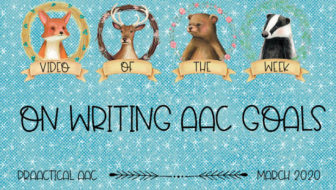
Writing strong goals that lead to meaningful growth is an important skill for AAC practitioners across service delivery settings. Today, we view an archived webinar on this topic hosted by PRC Saltillo. In this video, SLP Eliza Smith provides an overview of this topic, shares a framework for goal writing, discusses the use of goal attainment scaling, and reviews some AAC assessment considerations. Many thanks to Eliza and PRC Saltillo for this helpful presentation. Enjoy AAC – Ready, Set, GOAL! Direct Link to Video – https://www.youtube.com/watch?v=sEs4CgWFMLE You can download the handout packet for this session here. Stay tuned for Part 2 of this series next week.
Filed under: Video of the Week
Tagged With: AAC goals, goal setting
January 18, 2018
by Carole Zangari -
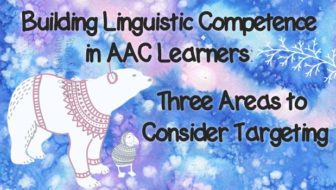
For several years, those who specialize in supporting AAC learners have stressed the need to develop AAC systems and programming that go beyond the communicative function of requesting in order to target the ability to protest, reject, comment, etc. This has been an important trend that will empower users of AAC to express themselves in much fuller ways. What other things should we be targeting in order to help our clients and students become more linguistically competent? Here are some ideas for goal areas to consider. Temporal Markers: While no one can overstate the importance of talking about our current needs, interests, observations, and preferences, we have to be careful not to get stuck in the moment. It is also important for our AAC learners to develop the language skills to be able to talk about things that already happened or that will/might be happening. Why? Among other things, this... [Read More...]
Filed under: Featured Posts, PrAACtical Thinking
Tagged With: goal setting, goals, language development, language goals, language intervention
June 20, 2016
by Carole Zangari -
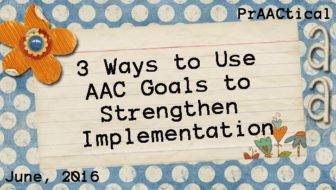
Concerned about AAC systems not being implemented as often as they should? Looking for ways to help AAC learners gain additional practice? Trying to help colleagues build the habit of actively supporting AAC learners? You are not alone. There are several strategies to boost the use of AAC, and adding some key phrases to the goals we write is one of them. Here are some thoughts on ways to use goals to strengthen the day-to-day AAC experiences of the learners with whom we work. Aided Language Input: Experienced AAC professionals and knowledgeable families understand that consistent use of this strategy is the most powerful way to build AAC use. If this is an issue for your AAC teams, consider adding verbiage to the goals that mandate the use of this strategy. Examples: “Given consistent AAC modeling, ___ will…” “When provided with aided language input, ___ will…” Frequent Implementation: Like many... [Read More...]
Filed under: Featured Posts, PrAACtical Thinking
Tagged With: AAC goals, goal setting, implementtion
April 7, 2015
by Carole Zangari -
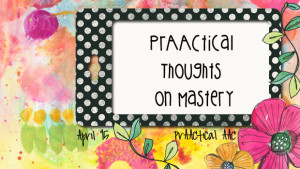
In many clinical training programs, new SLPs are taught to teach skills to mastery level, which generally means something like “80% over 3 consecutive sessions.” For our clients who are developing communication skills using AAC, though, this isn’t always the best approach. Here’s why. It doesn’t always make sense. Having a single standard for mastery is useful as a clinical management tool, but often doesn’t make sense in individual situations. Consider the skill itself. Would you be comfortable with your clients being 80% accurate when they: Cross the street? (Of course not.They need to be 1,000% accurate with that.) Ask for things? (Probably. Although Johnny has many days where he’s pretty happy with everything and doesn’t really have clear preferences or desires that we can ascertain. It would be nice to respect that. Not to mention the fact that he might want something that we haven’t offered him.) Make a... [Read More...]
Filed under: PrAACtical Thinking
Tagged With: goal setting, goals, intervention
November 17, 2013
by Carole Zangari -
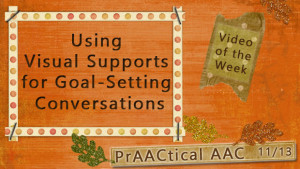
Empowering people with AAC needs to be actively involved in goal setting is something that most professionals would see as a priority. Where we get sometimes get stuck is on HOW to make that happen. In this week’s featured video, Dr. Joan Murphy demonstrates the use of Talking Mats in goal-setting conversations. You can learn more about that here. Direct link to video: https://www.youtube.com/watch?v=T-fFCtQ5sB
Filed under: Video of the Week
Tagged With: empower, goal setting, goals, Joan Murphy, Talking Mats
May 26, 2013
by Carole Zangari -
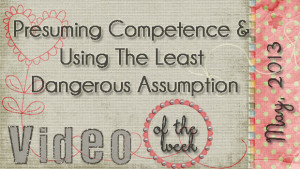
One of our core language posts from last month referred to the criterion of the least dangerous assumption (Donellan, 1984). This week we’re pleased to be able to expand on that topic and share a video by Dr. Cheryl Jorgensen, a former project director at the Institute on Disability at the University of New Hampshire. As we near the end of a school year in the US and begin IEPs that will direct the activities for the next academic year, we’re all reminded how critical it is to set high but attainable goals. Sometimes, that means making the least dangerous assumption. You can view the video here. Donnellan, A. (1984). The criterion of the least dangerous assumption. Behavior Disorders, 9, 2, 141-150.
Filed under: Video of the Week
Tagged With: Cheryl Jorgensen, expectations, goal setting, least dangerous assumption. Anne Donellan, presume competence
April 25, 2013
by Carole Zangari -
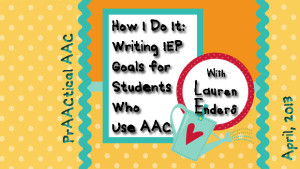
We’re so happy to welcome Lauren Enders back to share some more thoughts on AAC and the IEP. In her first post on this topic, Lauren addressed some frequently asked questions. Today, she provides a very valuable perspective on writing IEP goals for students who use or need AAC and some wonderful resources. Very often, I receive requests for support from teachers and speech therapists that are writing IEP goals for their students who use AAC. When we sit down to discuss their questions, the first thing I remind them is that AAC goals are no different from any other IEP goal. I recall a workshop I attended years ago presented by Gail VanTatenhove that helps put IEP goals for AAC into perspective. Gail said that AAC therapy is just language therapy. Isn’t that true? Aren’t we just teaching language? For this student, language is simply being expressed in a... [Read More...]
Filed under: PrAACtical Thinking
Tagged With: classroom, goal setting, goals, How I Do It, IEP, Lauren Enders, schools
April 24, 2013
by Robin Parker -
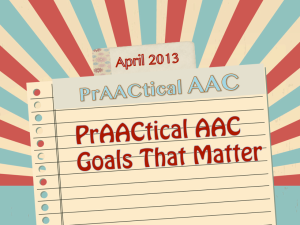
We can not say enough about writing AAC goals that are meaningful to the AAC user, but sometimes this is easier said than done. During discussions in a graduate seminar class, it was apparent that goal writing is not necessarily intuitive or even specifically taught. Goals are also the foundation behind any toy, app, or materials we use to set the stage for meaningful language experiences. Sample goals can serve as inspiration to develop specific, measurable, individualized AAC goals. For comprehensive information on a range of AAC goals, check out our PrAACtical Goals That Matter or How I Do It- AAC in the IEP by Lauren Enders. But to get started, here are some selected expressive language goals written AAC style. Expressive Language Using Prestored Messages (i.e., multiple words/sentences on one cell/button; E.g., a button with “I want music”) Request a turn using prestored messages (e.g., “Hey, don’t forget me! I... [Read More...]
Filed under: PrAACtical Thinking
Tagged With: AAC goals, goal setting, goals
October 11, 2012
by Carole Zangari -
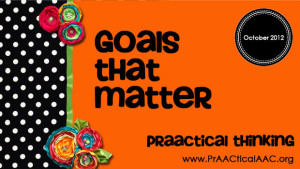
Like some of you, we often get asked “The Question.” People sometimes ask us to give them a recommendation about what AAC device or app is best for a particular individual. When the question comes from a parent or therapist whom we don’t know, it’s understandable. But when it is from a clinician we’ve taught, (who should know better), it’s a bit baffling. Obviously, we’d never make that kind of recommendation without having done an evaluation, or at least reviewing someone else’s assessment. We dread “The Question.” On the other hand, there are a lot of things that we wish people would ask that relate to how to help the communicator develop strong skills. This post relates to to one of those type of questions. “What should I work on?” “What kinds of AAC goals should we write?” We like those kinds of questions and our answers generally have one... [Read More...]
Filed under: PrAACtical Thinking
Tagged With: collaboration, goal bank, goal setting, goals, objectives








